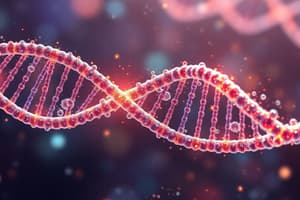Podcast
Questions and Answers
What was the year when the two enzymes responsible for restricting the growth of bacteriophage in Escherichia coli were isolated?
What was the year when the two enzymes responsible for restricting the growth of bacteriophage in Escherichia coli were isolated?
- 1960
- 1963 (correct)
- 1968
- 1965
What is the function of the first enzyme mentioned in the passage?
What is the function of the first enzyme mentioned in the passage?
- Cuts DNA
- Replicates DNA
- Adds methyl groups to DNA (correct)
- Transcribes DNA
How many restriction enzymes have been isolated from bacteria as of the passage?
How many restriction enzymes have been isolated from bacteria as of the passage?
- More than 1500
- More than 900 (correct)
- More than 500
- More than 1000
What is the recognition sequence of Hind II?
What is the recognition sequence of Hind II?
What is the origin of the first letter in the naming convention of restriction enzymes?
What is the origin of the first letter in the naming convention of restriction enzymes?
What is the origin of the 'R' in EcoRI?
What is the origin of the 'R' in EcoRI?
Flashcards are hidden until you start studying
Study Notes
Enzymes and Restriction Endonucleases
- In 1963, two enzymes responsible for restricting the growth of bacteriophage in Escherichia coli were isolated.
- One of these enzymes added methyl groups to DNA, while the other cut DNA, known as a restriction endonuclease.
Hind II Restriction Endonuclease
- Hind II was the first restriction endonuclease to be isolated and characterized in 1968, five years after the initial discovery.
- Hind II functions by recognizing a specific DNA nucleotide sequence and cutting DNA molecules at a particular point.
- The specific base sequence recognized by Hind II is known as the recognition sequence.
Restriction Enzymes
- Over 900 restriction enzymes have been isolated from more than 230 strains of bacteria.
- Each of these enzymes recognizes different recognition sequences.
- The convention for naming these enzymes is based on the genes and species of the prokaryotic cell from which they were isolated.
- Example: EcoRI comes from Escherichia coli RY 13, with the letter ‘R’ derived from the name of the strain.
Studying That Suits You
Use AI to generate personalized quizzes and flashcards to suit your learning preferences.



